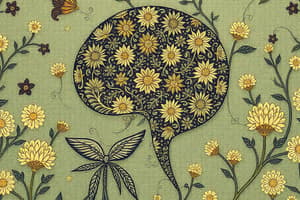Podcast
Questions and Answers
Which stage of development is characterized by children learning to share, follow rules, and form relationships with peers?
Which stage of development is characterized by children learning to share, follow rules, and form relationships with peers?
- Early childhood (2-6 years) (correct)
- Middle childhood (6-12 years)
- Infancy (0-2 years)
- Adolescence (12-18 years)
What marks the beginning of life outside the womb according to the text?
What marks the beginning of life outside the womb according to the text?
- Middle childhood (6-12 years)
- Prenatal development
- Early childhood (2-6 years)
- Infancy (0-2 years) (correct)
During which stage do children begin to develop a sense of self?
During which stage do children begin to develop a sense of self?
- Early childhood (2-6 years)
- Infancy (0-2 years)
- Middle childhood (6-12 years) (correct)
- Adolescence (12-18 years)
What is a key aspect of prenatal development mentioned in the text?
What is a key aspect of prenatal development mentioned in the text?
Which stage of development involves rapid physical and cognitive growth?
Which stage of development involves rapid physical and cognitive growth?
What is the main focus of adolescence according to the text?
What is the main focus of adolescence according to the text?
Which cognitive development theory emphasizes the role of cultural and social factors?
Which cognitive development theory emphasizes the role of cultural and social factors?
What is a key element of Piaget's cognitive development theory?
What is a key element of Piaget's cognitive development theory?
What characterizes late adulthood according to the text?
What characterizes late adulthood according to the text?
Which theory examines both biological, psychological, and sociocultural factors in human development?
Which theory examines both biological, psychological, and sociocultural factors in human development?
What sets Vygotsky's sociocultural theory apart from Piaget's cognitive development theory?
What sets Vygotsky's sociocultural theory apart from Piaget's cognitive development theory?
Flashcards are hidden until you start studying
Study Notes
Life Span, Growth, and Development: Exploring Stages, Cognitive Gains, and Theories
Life span, growth, and development encompass the transformative journey an individual experiences from conception until the end of their life. This holistic perspective captures both the physical evolution and cognitive advancements that shape our existence. Let's delve into the intricacies of these intertwined aspects and explore the stages, theories, and cognitive development that define this rich tapestry of human development.
Stages of Development
The human life span can be broadly divided into the following developmental stages:
-
Prenatal development: The initial stage of life begins at conception and ends at birth, during which time the body forms, organs develop, and the nervous system begins to function.
-
Infancy (0-2 years): This stage marks the beginning of life outside the womb. Babies learn to eat, crawl, and communicate, exhibiting rapid cognitive and physical growth.
-
Early childhood (2-6 years): In this stage, children develop fine and gross motor skills, improve language abilities, and begin to form social connections. Kindergartners learn to share, follow rules, and form relationships with peers.
-
Middle childhood (6-12 years): During this stage, children hone their cognitive and social skills, become more independent, and begin to develop a sense of self.
-
Adolescence (12-18 years): This critical period is marked by physical, cognitive, and social changes that transform teens into adults. Adolescents face challenges as they navigate their emerging identities, further develop their cognitive abilities, and establish more complex social relationships.
-
Early adulthood (18-44 years): During this stage, individuals establish careers, form marriages, and start families. Adults in this age range focus on consolidating their cognitive abilities, building emotional stability, and expanding their social networks.
-
Middle adulthood (45-65 years): This stage is characterized by increased stability, with individuals often reaching their peak cognitive abilities. Middle-aged adults may also experience shifts in their social and family roles.
-
Late adulthood (65+ years): Individuals in this stage face physical and cognitive changes, including memory loss and decreased mobility. However, they also have the opportunity to engage in new activities, form meaningful relationships, and reflect on their lives.
Cognitive Development
Cognitive development refers to the evolution of mental processes, including thinking, reasoning, problem-solving, and memory. Piaget's theory and Vygotsky's sociocultural theory are two prominent frameworks that help explain cognitive development over the lifespan.
Piaget's theory proposes four distinct stages: sensorimotor stage, preoperational stage, concrete operational stage, and formal operational stage. Each stage represents an evolution in cognitive development, with children progressing from basic sensory-motor activities to higher-order thinking processes.
Vygotsky's sociocultural theory, on the other hand, emphasizes the role of cultural and social factors in cognitive development. Vygotsky proposed the zone of proximal development (ZPD), which is the difference between what a child can do without guidance and what they can do with help. This concept highlights the importance of education, mentorship, and peer interactions in promoting cognitive growth.
Theories of Development
Theories of development provide a framework for understanding the complex interplay between biological, psychological, and environmental factors that shape human growth and development. Some of the most influential theories include:
-
Erikson's psychosocial stages of development: Erikson's theory examines the interplay between biological, psychological, and sociocultural factors and proposes eight stages of development, focusing on the attainment of psychosocial virtues at each stage.
-
Bronfenbrenner's ecological systems theory: This theory posits that the environment, including the family, school, and community, plays a critical role in shaping human development. Bronfenbrenner's theory emphasizes the importance of understanding the interaction between these systems and the individual.
-
Hall and Hagen's life-span theory: This theory posits that development is a continuous process that occurs throughout the entire lifespan. Hall and Hagen's theory emphasizes the importance of understanding the interplay between biological, psychological, and sociocultural factors at each stage of development.
While each theory offers valuable insights into the complexities of human growth and development, it is essential to consider the limitations of each framework. Many theories focus on specific aspects of development and may not account for the full range of factors that shape human growth and development.
Physical Growth
Physical growth refers to the evolution of the human body over time, encompassing changes in size, weight, and appearance. Physical growth can be divided into two primary phases:
-
Childhood growth: Children experience rapid physical growth during their early years, with primary growth occurring in the long bones of their arms and legs.
-
Adolescent growth spurt: Adolescents undergo a growth spurt between the ages of 11 and 16, during which time they experience rapid increases in height, weight, and overall body mass.
Physical growth is influenced by various factors, including genetics, diet, and overall health. Additionally, physical growth is typically accompanied by physical maturation, which refers to the development of secondary sexual characteristics and the ability to reproduce.
Conclusion
Life span, growth, and development encompass a complex interplay of biological, psychological, and sociocultural factors that shape the human experience. Understanding the stages of development, cognitive development, theories of development, and physical growth empowers us to better support individuals at every stage of their journey. By embracing a holistic perspective, we can foster the growth and development of individuals, families, and communities.
Studying That Suits You
Use AI to generate personalized quizzes and flashcards to suit your learning preferences.




